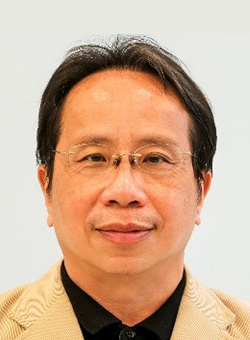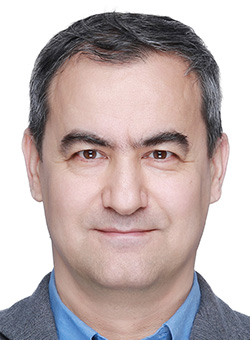- Download
-
 Call for Papers Flyer
Call for Papers Flyer
-
 Full Paper Template (English)
Full Paper Template (English)
-
 Full Paper Template (Chinese)
Full Paper Template (Chinese)
-
 Abstract Template
Abstract Template
-
 Poster Presentation Template
Poster Presentation Template
- Contact Information
- Email: May@conference123.net
- Cell Phone: 0086-18616502321
- QQ: 2934920393
The information about the Keynote Speakers of ICEDUIT2025 is as follows, which will be updated regularly.
 Dr. Wu-Yuin Hwang, Professor
Dr. Wu-Yuin Hwang, Professor
Dr. Wu-Yuin Hwang, Professor
Faculty of Science and Engineering, Taiwan Dong-Hwa University, Taiwan, China
Institute of Network Learning Technology, Taiwan Central University, Taiwan, China
Biography: Dr. Wu-Yuin Hwang is the Dean of the Faculty of Science and Engineering at Taiwan Donghua University. He is also a distinguished professor at the Institute of Network Learning Technology, Taiwan Central University. His Major research interests: Using AI and Anything to Text Recognition technologies for education, particularly smart learning in authentic contexts and multimedia human-computer interaction for learning. Owing to the outstanding contributions of research outputs to National Science Council, Taiwan, Dr. Hwang received the Ta-You Wu, Memorial Award in 2005 and Outstanding Research Award (Ministry of Science and Technology) in 2021. In 2020, the highest impact factor SSCI journal (IF= 6.0, 2024) in the area of technology enhanced language learning, Journal of Computer Assisted Language Learning, counts its publications in recent 12 years (2008-2019). Dr. Hwang was ranked top 1 in terms of the number of publications, H-index papers and impact factors. These showed that the contribution of Dr. Hwang to the field of technology-assisted language learning has been significantly recognized. In the 10 years (2007-2017), Dr. Hwang was ranked in top 7 scholars of the world in terms of publication performance of 65 high quality SSCI journals in the area of instructional design and technology.
Topic: Xducation of Things (XoT)-Education of All Things with AI and Edge Computing
Abstract: Most English foreign language (EFL) studies focus solely on human beings. This research explores how edge computing can facilitate learning for all things. The XoT (Xducation of Things) framework was proposed to educate both human and all things. All things encompass two terms: AI-Agent and smartthings (covering physical and digital smart objects). At the core of this framework is Smart Question Answer Forwarding Mechanism (SQA-Forwarding), specifically designed to assist all things in building knowledge. To demonstrate this, the smartXoT environment was developed based on XoT framework, and its impacts on EFL learners was assessed. A quasi-experimental study involving 26 EFL learners, divided into an experimental group (EG) and a control group (CG), examined the differences in learning achievement of smartthings and EFL learners when using the smartXoT environment with/without SQA-Forwarding. Findings, on one hand, indicated that smartthings in the EG developed knowledge bases greater than those in the CG. On the other hand, the interaction between EFL learners and smartthings with SQA-Forwarding significantly improved learners’ writing skills, with revisions playing a crucial role in enhancing writing quality. Thus, the XoT framework offers a novel and promising approach to educating both humans and all things.
 Dr. Shadiev Rustam Narzikulovich, Professor
Dr. Shadiev Rustam Narzikulovich, Professor
Dr. Shadiev Rustam Narzikulovich, Professor
College of Education, Zhejiang University, Hangzhou, China
Biography: Dr. Shadiev Rustam Narzikulovich is currently a tenured professor at the College of Education, Zhejiang University (China), specializing in advanced learning technologies for language learning and cross-cultural education. He earned his Ph.D. in Network Learning Technology from Taiwan Central University (China) in 2012. He is a Fellow of the British Computer Society, a Senior Member of the Institute of Electrical and Electronics Engineers (IEEE), and a member of the Association for Computing Machinery (ACM). In 2019, he was honored with the title of Distinguished Professor of Jiangsu Province (China). Additionally, he has been recognized as one of the most cited Chinese researchers in the field of education by Elsevier, Scopus, and Shanghai Ranking for four consecutive years, from 2020 to 2023. He was also listed among Stanford/Elsevier’s Top 2% Scientists in the field of education and educational research in 2023 and 2024. He serves on the Editorial Board of several prestigious journals, including the Journal of Educational Technology & Society, the Journal of Computer Assisted Learning, and Smart Learning Environments. He also guest edits special issues for various esteemed journals, such as the Journal of Educational Technology & Society, Sustainability, and Frontiers in Psychology.
Topic: Empowering Global Learning Through AI: Innovations for Cultivating Global Citizenship
Abstract: This keynote address explores the pivotal role of artificial intelligence (AI) in transforming education, with a particular emphasis on advancing global citizenship. Drawing on insights from recent empirical research, it demonstrates how AI-powered technologies can enhance learning experiences and foster intercultural competencies. In an era of growing global interconnectedness, nurturing global citizenship has become imperative. To meet this need, we designed immersive learning environments where students from China and various other countries engaged in dynamic exchanges. These activities encouraged participants to share cultural knowledge and perspectives on global citizenship, enriching their appreciation of diverse viewpoints. AI technologies served as integral components of these environments. They supported learners by enhancing their understanding of course materials, delivering accurate and timely answers to queries, and providing reliable guidance throughout the learning process. These tools also proved instrumental in fostering cross-cultural understanding, improving communication skills, and enabling students to collaborate effectively with peers from different cultural contexts, even when communicating in their native languages. This speech highlights the transformative impact of AI on educational practices and offers practical strategies for educators and researchers aiming to embed AI tools into global citizenship education initiatives.



